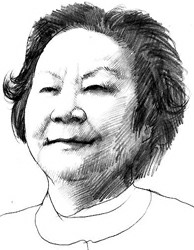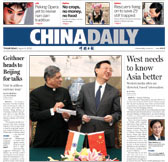


Ye Shuhua, born in 1927,has been engaged in research on universal time settings and the earth's rotation for many years. She has directed the Shanghai Observatory of the Chinese Academy of Sciences and served as Vice Chairwoman of the executive committee of the International Astronomy Union. Ye has won numerous scientific awards, and the asteroid QSO No.3241 was named after her in 1994.
World Expo 2010 Shanghai China will raise the curtain in May on a six-month attraction to dazzle the world. More than 200 countries and regions will exhibit the splendor of their distinctive cultures and pioneering ideas. The towering red-domed China Pavilion will showcase the beautiful landscapes of our country, the brilliance of Chinese culture and the evolution of our social progress. It will be a golden opportunity for residents in Shanghai, the Yangtze River Delta and all other parts of China to enjoy a global pageant without traveling overseas.
"That friends should come to one from afar, is this not after all delightful?" This famous saying of Confucius echoes our heartfelt wishes. We are ready to welcome our friends and guests from across the world.
In the 1930s, Shanghai was an Oriental metropolis famed for its international-style buildings. However, that prosperity was based on settlements leased by foreign powers like Britain, France and Japan. The feasting, revelries, luxuries and dazzling neon lamps of that era could not gloss over the sprawling slums and abject poverty of most Shanghai residents. The city at that time was a paradise for only a privileged few.
Under the leadership of the Chinese Communist Party, China shook off the tribulations of the past and ushered in a new era of prosperity. The first 30 years after the founding of the People's Republic of China witnessed astonishing advances, followed by even more in the next 30 years, after China initiated its policies of opening to the outside world and reforming its economy. Today it stands as one of the strongest countries in the world. The 2008 Beijing Olympic Games were a monument to the New China. The Bird's Nest, the Water Cube, and especially the splendid opening ceremony left an indelible imprint on the world. This great sporting event, which lasted 14 days, is now followed by the spectacular 184-day World Expo Shanghai China.
To welcome the world, Shanghai has expanded its subway network to 400 kilometers, deployed electricity multiple units linking it with other cities and upgraded 1,600 buses. The city has also been reinventing its urban image by the day. It will greet guests from around the world with its blue skies, clear water, flourishing street trees, neat buildings, bustling commercial centers, towering skyscrapers, and bridges and tunnels -- all designed to illustrate the theme of "Better City, Better Life." There will also be tens of thousands of volunteers extending a warm hand of welcome to visitors who face language barriers in an unfamiliar place. As Shanghai residents, we are determined to be impeccable hosts and cultural ambassadors to people of different cultures.
The above comments are my heartfelt thoughts as a resident of the host city. Since I am also a scientist who has specialized in astronomic research for decades, I would like also to share some of my thoughts from the perspective of a scientist.
Although there is no direct relationship between astronomic research and the World Expo, I think the fact that Shanghai was selected as a host city for the first time in the 150-year history of world expositions is a tribute to the strength of our country. Astronomers contribute to that strength. We are at the forefront of space research and exploration. The Shanghai Astronomical Observatory is building a 65-meter radio telescope that is scheduled to begin operation by September 2012 and will become part of the second phase of China's lunar exploration program. With this telescope, we will enhance our research capabilities in such areas as deep-space exploration and earth-measurement precision techniques. We will have the opportunity to facilitate our work in the field of application satellites. So far, most of our application satellites have been designed for meteorological and oceanographic studies, and we have not yet delved into the field of gravity satellites, which are capable of studying changes in the earth's gravitational fields and monitoring global changes. These satellites are also useful in the study of earthquakes, oceans, glaciers and climate.
If the Shanghai Astronomical Observatory, through domestic and international cooperation, develops the ability to launch a gravity satellite within five years, our national stature will be enhanced. We should promote this project as soon as possible and try to make Shanghai an important aerospace base of China by 2012 or 2013.
Delightful events always bring high spirits. I have discussed my feelings about both the World Expo and astronomical research. They are both inspired with enthusiasm. Working together, we can bring prosperity to our country and happiness to our people.


